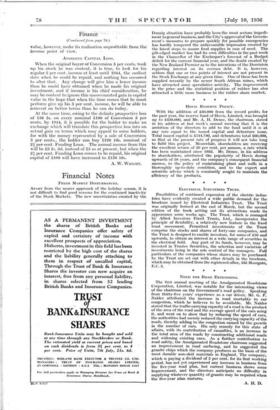Financial Notes
PRF.SII MARKET DISTURBANCES.
APART from the nearer approach of the holiday season, it is not difficult to find good reasons for the continued inactivity of the Stock Markets. The new uncertainties created by the Danzig situation have probably been the most serious impedi- ment to general business, and the City's approval of the Govein- ment's measures to prepare quickly for possible emergencies has hardly tempered the unfavourable impression created by the latest steps to assure food supplies in case of need. The gilt-edged market has had its own difficulties in the past week in the Chancellor of the Exchequer's forecast of a Budget deficit for the current financial year, and the doubt created by the New Zealand Premier as to the intentions of the Dominion regarding interest on its oversea debt. It is, however, seldom that one or two points of interest are not present in the Stock Exchange at any given time. One of these has been supplied recently by the newer South African mines, which have attracted some speculative activity. The improvement in the price and the statistical position of rubber has also attracted a little more business to the rubber share market.
Hovis RESERVE POLICY.
With the addition of £30,000 from the record profits for the past year, the reserve fund of Hovis, Limited, was brought up to £450,000, and Mr. A. H. Dence, the chairman, stated in his address at last week's annual meeting that it is the ambition of the directors to add to the fund until it is at any rate equal to the issued capital and debenture issue. Total issued capital is £544,780, and debentures total £60,000, so that at the present rate of progress it will not take long to fulfil this project. Meanwhile, shareholders are receiving the excellent return of 20 per cent. per annum, a rate which has been maintained since 1932. Mr. Dence, in his address to shareholders, attributed the popularity of Hovis during upwards of 38 years, and the company's consequent financial success, to the policy of maintaining plant and mills in a thoroughly up-to-date condition, and to the expert and scientific advice which is constantly sought to maintain the efficiency of the products.
ELECTRICAL INDUSTRIES TRUST.
Possibilities of continued expansion of the electric indus- tries have evidently created a wide public demand for the brochure issued by Electrical Industries Trust. The Trust was originally formed at the end of March, but the second edition - of the book setting out -its attractions made its appearance some weeks ago. The Trust, which is managed by Allied Investors Fixed Trusts, Ltd., incorporates the principle of flexibility, a relatively new feature in the fixed trust movement. Permitted investments of the Trust comprise the stocks and shares of forty-one companies, and the Trust is designed to enable investors, for sums of £50 and upwards, to obtain an interest in a wide range of securities in the electrical field. Any part of its funds, however, may be invested in Trustee Securities, the selection and variation of investments being in the sole control of the managers. Full particulars of the companies whose shares may be purchased by the Trust are set out with other details in the brochure, which may be obtained from the registered office, 165 Moorgate, E.C. 2.
* * * *
NEED FOR ROAD EXTENSIONS.
The first annual meeting of the Amalgamated Roadstone Corporation, Limited, was notable for the interesting views of the chairman on the Government's road policy. Speaking from thirty-five years' experience as a car driver, Mr. G. F. Nalder attributed the increase in road- mortality- to car congestion, which he believes to be avoidable. Mr. Nalder stated that the traffic-carrying capacity of a road is the product of the area of the road and the average speed of the cars using it, and went on to show that by reducing the speed of cars, the authorities had merely reduced the carrying capacity of the roads, thereby adding to the congestion caused by the growth in the number of cars. His only remedy for this state of affairs, with its contribution of casualties, is an increase in the total area of the roads by constructing additional roads and widening existing ones. As a further contribution to road safety, the Amalgamated Roadstone chairman suggested an improvement in road surfacing, and he suggested the granite chips which the company produces as the basis of the most durable non-skid materials in England. The company, which is paying a dividend of 5 per cent. for its first working period, has not yet experienced any increase in business from the five-year road plan, but current business shows some improvement, and the -directors anticipate no difficulty in supplying whatever quantity of granite may be required_when the five-year plan matures.
A. H. D.










































 Previous page
Previous page